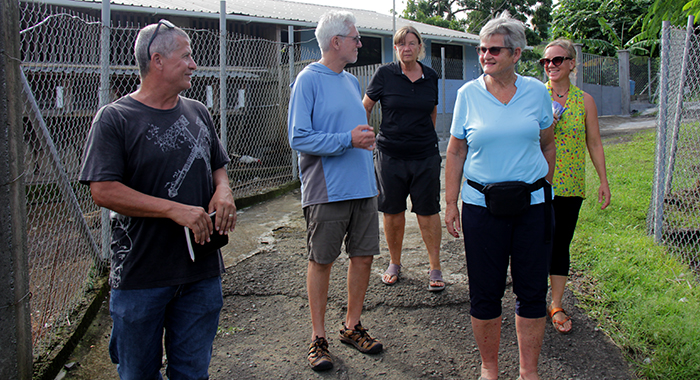The climate and sustainable development programmes at Richmond Vale Academy (RVA) have attracted the attention of the green movement in Chicago and three students from that U.S. city will enrol on scholarship next year.
RVA has rehabilitated its facilities and fully reactivated its programmes following the devastation of the April 2021 eruption of La Soufriere.
Since then, the institution has been networking with different organisations in the United States and, in Chicago, efforts have focused on students who are interested in enrolling in RVA’s programme but cannot afford to do so.
The three Chicago students will come to RVA next year through a partnership between The GAIA Movement, an environmental organisation focused on recycling textiles and education, and Stein Learning Gardens, which is part of a social justice campus that is located on the grounds of a St. Sabina Catholic Church on the southside of Chicago.
Community Outreach and Operations Manager for Stein Learning Gardens, Richard Kirkpatrick and Eva Nielsen, President, CEO of The GAIA Movement as well as Marianne Thomsen, operations manager at The GAIA Movement visited St. Vincent last week, to see the RVA campus as well as some of its programmes and projects.
Thomsen had visited St. Vincent 40 years ago, when she worked in building latrines in Chateaubelair, a town in the northwest of the island, close to where RVA is located. She also visited in 2019 and was encouraged by the number of townsmen who recognised her.
Stein Learning Gardens at St. Sabina was founded in 2018 by local philanthropist, Barbara Stein, inspired by the work of activist priest Father Michael Pfleger.
“One of the things that we do is that we teach how to grow food, but we also build community gardens,” Kirkpatrick explained.
He said that Chicago Grows Food, a partner organisation, is very big on building home gardens and addressing food insecurity through helping people learn to produce their own food organically in a community that has no options.
Kirkpatrick said:
“Once I heard about the work that Richmond Vale Academy was doing, I was going, ‘Wow! This is fantastic! This is very interesting to see what you’re trying to address in St. Vincent is kind of what we’re doing here in Chicago. And we all agree that it would be great to have loads more home gardens.”
Stein Learning Gardens and the GAIA Movement discussed offering scholarships to students from the South Side of Chicago.
“If you’re familiar with South Side Chicago, it’s just that there’s not enough resources for anything, really. And so, it was very exciting for us to be able to talk to people in the community about the opportunity to learn about urban farming, something that they’re already interested in,” Kirkpatrick explained.
During their trip to St. Vincent, the group also visited home gardens that RVA has helped to establish in various communities as well as its coral restoration project. They also visited WindBlow Valley Ranch, in Belmont, which produces an organic liquid fertiliser.
“RVA is an extraordinary place where young people from around the world are learning about the climate crisis and the things that are affecting communities here in St. Vincent and the like. But they also have the opportunity to learn what’s really going on in the world from a climate perspective,” Kirkpatrick commented.
“They are learning about permaculture and growing healthy, organic crops and doing some valuable work in the community on a volunteer basis, which is, in my opinion, a wonderful experience.”
He described the coral restoration project as “fantastic”, adding that it has potential to be “a viable, full-time employment, ultimately, for people in the community and be doing good stuff for the planet”.
He noted that the RVA’s programme is older than Stein Learning Gardens’ and is also more global in its reach.
Kirkpatrick said he has quite a few connections in the business community, adding that his first-hand knowledge of RVA’s work would help him to better make his pitch to help students from Chicago to join RVA’s programme.
The scholarship for the three Chicago students is being financed through The GAIA Movement’s textile recycling programme, which collects used clothing that would otherwise end up in landfills and extend their life by selling them in Central America.
“And so that’s the way we earn money so we support projects, sustainable farming in Africa and then we also have this that we give scholarships to RVA.’
Nielsen said that communities in the South Side of Chicago need resources, but also lack community leaders.
“There are a lot of great, young bright people who are not really doing anything. The students who have won the scholarships are so excited and they really want to do great things but they are inexperienced and do not really know how.”
Nielsen is confident that these students’ experiences at RVA would help to point them in the right direction.
Meanwhile, RVA Director of Outreach and Public Diplomacy, Stina Herberg, was excited about the first batch of students from Chicago and the effort of The GAIA Movement in that regard.
“If they were not able to get a scholarship, they would not be able to do this. And what we can see is that these students would all have a potential to go back and do more in their communities. And that’s what they’re aiming for,” she explained.
She said RVA is looking for candidates who, after completing their programmes, would have an impact on their communities.
“This means that Richmond Vale Academy could have a broader impact, specifically food and water security and climate change,” Herberg said.






